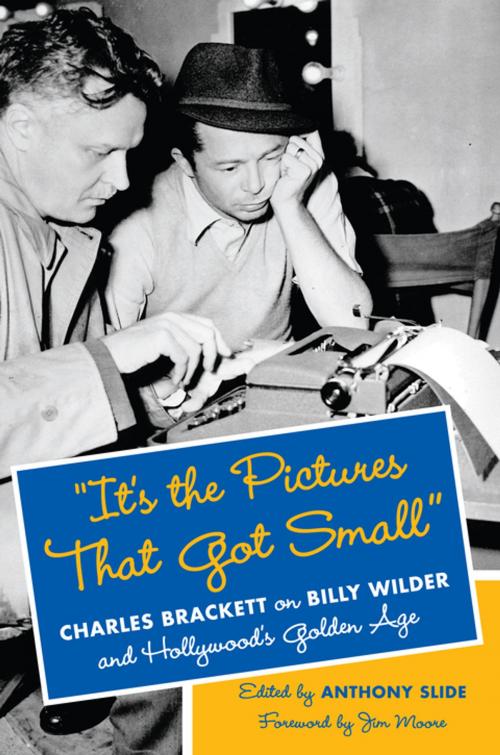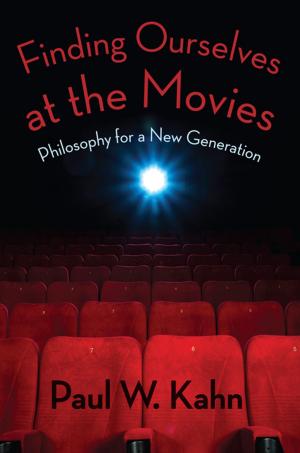"It's the Pictures That Got Small"
Charles Brackett on Billy Wilder and Hollywood's Golden Age
Nonfiction, Entertainment, Film, History & Criticism, Performing Arts| Author: | ISBN: | 9780231538220 | |
| Publisher: | Columbia University Press | Publication: | December 16, 2014 |
| Imprint: | Columbia University Press | Language: | English |
| Author: | |
| ISBN: | 9780231538220 |
| Publisher: | Columbia University Press |
| Publication: | December 16, 2014 |
| Imprint: | Columbia University Press |
| Language: | English |
Golden Age Hollywood screenwriter Charles Brackett was an extremely observant and perceptive chronicler of the entertainment industry during its most exciting years. He is best remembered as the writing partner of director Billy Wilder, who once referred to the pair as "the happiest couple in Hollywood," collaborating on such classics as The Lost Weekend (1945) and Sunset Blvd (1950).
In this annotated collection of writings taken from dozens of Brackett's unpublished diaries, leading film historian Anthony Slide clarifies Brackett's critical contribution to Wilder's films and Hollywood history while enriching our knowledge of Wilder's achievements in writing, direction, and style. Brackett's diaries re-create the initial meetings of the talent responsible for Ninotchka (1939), Hold Back the Dawn (1941), Ball of Fire (1941), The Major and the Minor (1942), Five Graves to Cairo (1943), The Lost Weekend, and Sunset Blvd, recounting the breakthrough and breakdowns that ultimately forced these collaborators to part ways.
Brackett was also a producer, served as president of the Academy of Motion Picture Arts and Sciences and the Screen Writers Guild, was a drama critic for the New Yorker, and became a member of the exclusive literary club, the Algonquin Round Table. Slide provides a rare, front row seat to the Golden Age dealings of Paramount, Universal, MGM, and RKO and the innovations of legendary theater and literary figures, such as Alfred Lunt, Lynn Fontanne, Edna Ferber, and Dorothy Parker. Through Brackett's keen, witty perspective, the political and creative intrigue at the heart of Hollywood's most significant films comes alive, and readers will recognize their reach in the Hollywood industry today.
Golden Age Hollywood screenwriter Charles Brackett was an extremely observant and perceptive chronicler of the entertainment industry during its most exciting years. He is best remembered as the writing partner of director Billy Wilder, who once referred to the pair as "the happiest couple in Hollywood," collaborating on such classics as The Lost Weekend (1945) and Sunset Blvd (1950).
In this annotated collection of writings taken from dozens of Brackett's unpublished diaries, leading film historian Anthony Slide clarifies Brackett's critical contribution to Wilder's films and Hollywood history while enriching our knowledge of Wilder's achievements in writing, direction, and style. Brackett's diaries re-create the initial meetings of the talent responsible for Ninotchka (1939), Hold Back the Dawn (1941), Ball of Fire (1941), The Major and the Minor (1942), Five Graves to Cairo (1943), The Lost Weekend, and Sunset Blvd, recounting the breakthrough and breakdowns that ultimately forced these collaborators to part ways.
Brackett was also a producer, served as president of the Academy of Motion Picture Arts and Sciences and the Screen Writers Guild, was a drama critic for the New Yorker, and became a member of the exclusive literary club, the Algonquin Round Table. Slide provides a rare, front row seat to the Golden Age dealings of Paramount, Universal, MGM, and RKO and the innovations of legendary theater and literary figures, such as Alfred Lunt, Lynn Fontanne, Edna Ferber, and Dorothy Parker. Through Brackett's keen, witty perspective, the political and creative intrigue at the heart of Hollywood's most significant films comes alive, and readers will recognize their reach in the Hollywood industry today.















